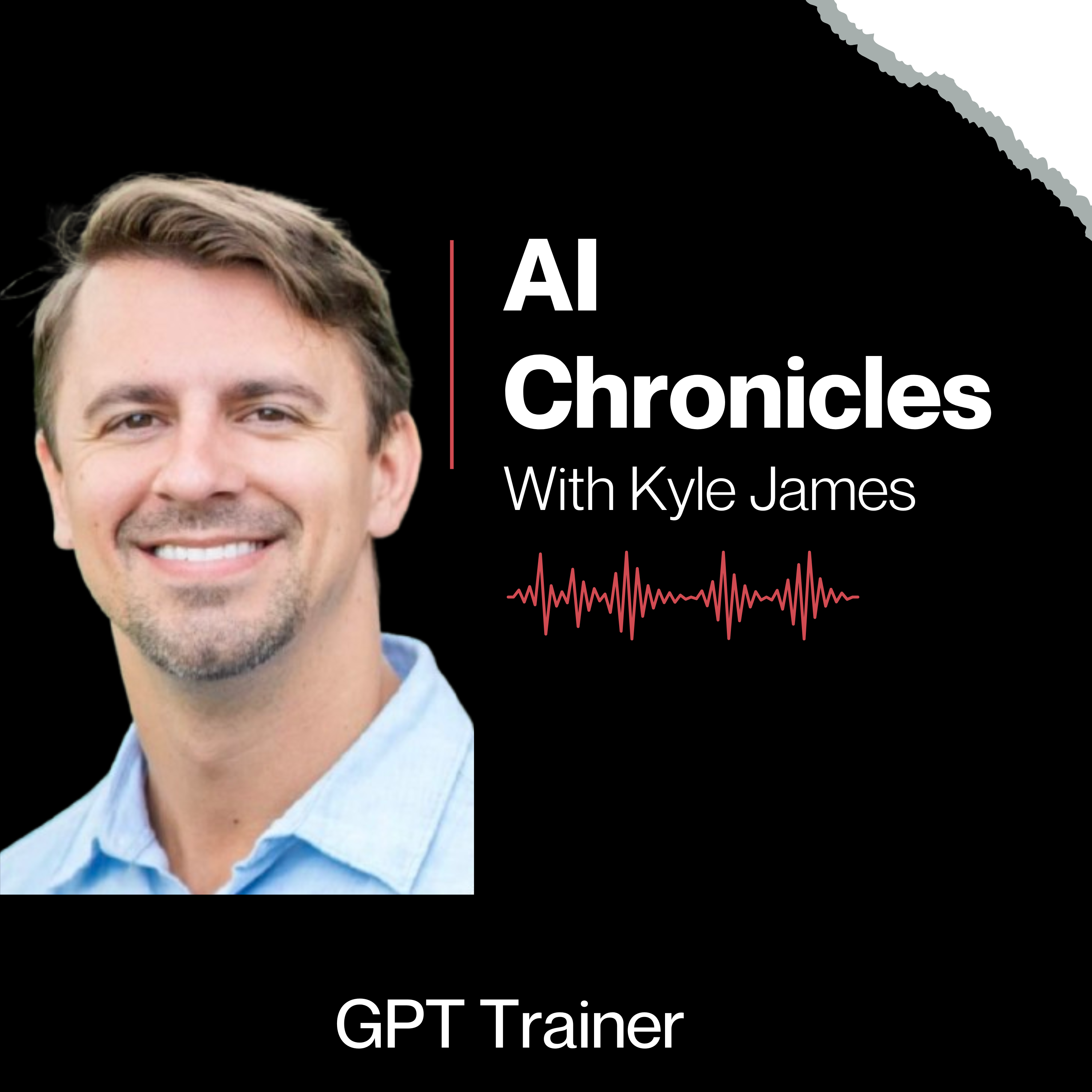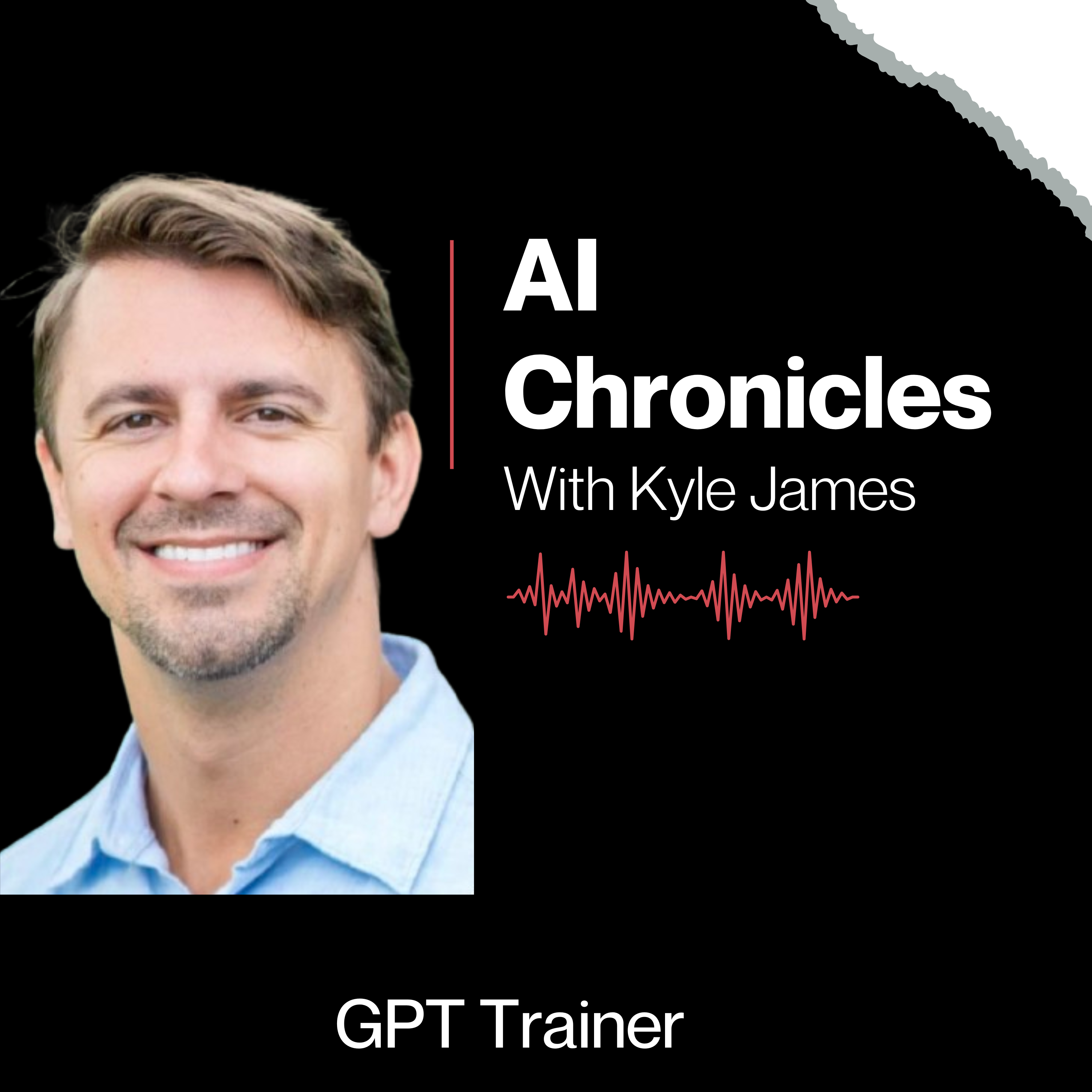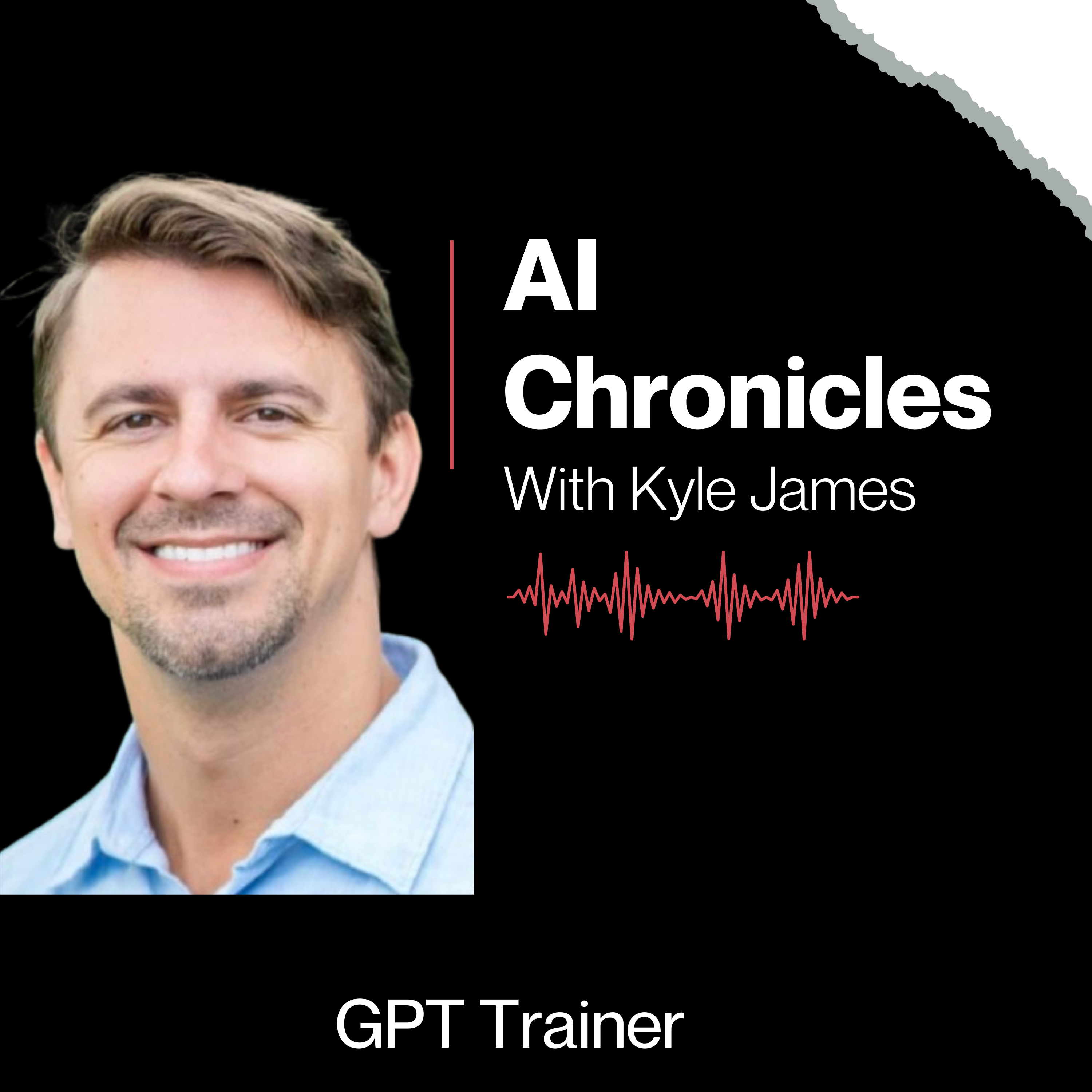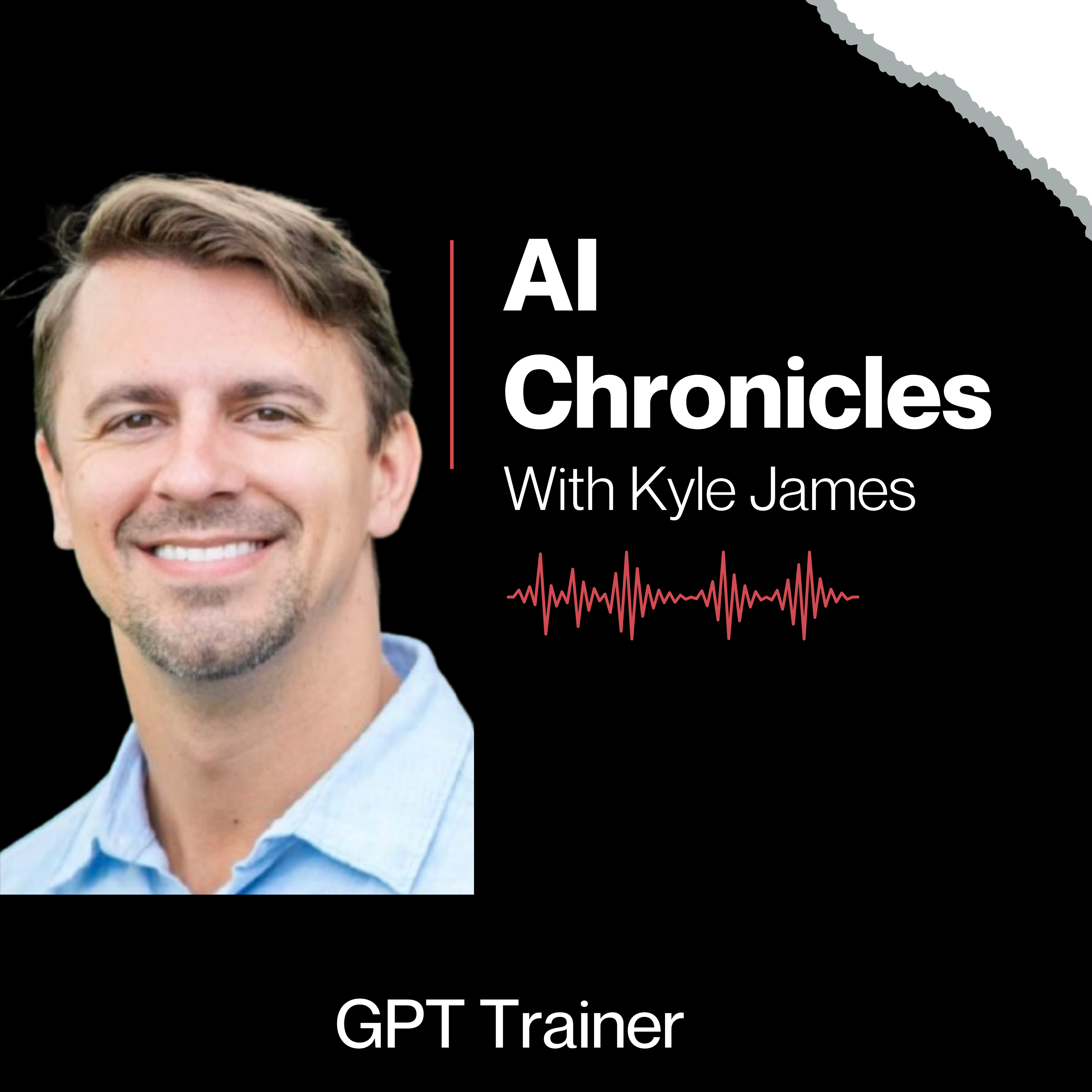Episode Transcript
Kyle James (00:00.802)
Hey, welcome to the AI Chronicles podcast. I'm your host, Kyle James. And today we'll be diving in headfirst into how an AI powered and automation company called Aidgentic is using AI inside of their own business. And we'll share the exact steps that you can take in order to implement AI for yourself. Now, before I dive into that, listen closely. Are you looking to implement AI inside of your own company or just struggling to get your AI to stop hallucinating? Speak to GPT trainer.
GPT Trainer literally builds out and manages your AI agent for you, eliminating hallucinations for good. Go to gpt-trainer.com. I promise you, it'll be the biggest time saving decision that you've made all year. Trying to set up AI on your own is like trying to build a house from scratch. Sure, you could do it, but the time and frustration that's going to take you to get it finished just isn't worth it. It's a thousand times faster and safer to hire professionals.
Scheduled consultation today, once again, that's gpt-trainer.com. Say hi with me, Coltrane Kubo, who is the co-founder of Agentic, an agency that specializes in building AI powered tools and automations to support small businesses and solopreneurs. Since beginning nearly a year ago, they've already helped over 15 clients save thousands of man hours and generate significant lifts in revenue through new AI offerings.
Automated outreach, smart sales, enablement tools, and much more. So excited for this conversation today. Hey Coltrane, welcome to the show. How are you doing, friend?
Coltrane Kubo (01:33.135)
Hey Kyle, great to be talking with you and excited to be here, man.
Kyle James (01:36.672)
Awesome, man. So let's jump into it. So tell me how did agentic come to be like, I know you've got a little bit of like the real estate license background. So walk us through like kind of what exactly is agentic and what it does.
Coltrane Kubo (01:48.635)
Yeah, absolutely. So the idea behind agentic came actually from when I was working at an agency for marketing. Most of my career, I was a growth marketer and we did a lot of paid ads, reporting, things like that. And at my latest job, we were working with a number of companies and it was taking a while to pull the information, create customized reporting for them.
That's when we started exploring other solutions and I came across chat GPT. It's probably where most people start their journey in AI. And exactly. Yeah. The whole light bulb goes off, but ended up making custom GPTs to build out our reporting docs and really just take all of our internal knowledge and output it so that instead of spending like.
Kyle James (02:17.868)
Yeah, nice. That's the beginning stage of everyone, the chat chibi tea. the eureka moment.
Coltrane Kubo (02:37.977)
eight hours a week building out this client report that we would be making. We cut it down to one with like just QAs at the end. So that was kind of my first baby steps into automation from there. I looked into reporting automation as well as just streamlining like the data flows so that we could have dashboards for the clients that were just readily populated from like the meta ad manager instead of needing to export it each time. And, you know, that was like a huge light bulb moment, like you said, because we were spending
50 plus hours a week on this kind of thing and we cut it down to like 20. So at that point I realized, wow, this is something that I enjoy so much more than marketing. I liked marketing, but I loved being able to streamline those processes, optimize what was already there in the business. So I took the leap. I found a really great co-founder around that time too. And we decided to go on it together and start Agentic to do this for other businesses.
Kyle James (03:31.084)
Yeah, that that's so awesome. So like it's, it's cool that you, know, cause there's so many people who like, come across like chat, GBT and like, they see the value, but they don't take like a deeper dive like you did. And what was that like, like when you finally said like, wow, we saved this, this so many hours in the marketing space. Like, how did you, how did you figure out like, man, is this, I'm to go from like a paid position to all right, I'm going to co-found with another person and just take a leap of faith.
What was that like? What was going through your head when you make that jump?
Coltrane Kubo (04:02.329)
Yeah, it was a big leap to take. I had started a web business before and that kind of generated passive income. So I did have a bit of experience being outside of a company and earning money. But to like co-found an entire business, like file that LLC and everything that was
pretty daunting of a moment, but I knew that we had something there and it was really just like first mover advantage by diving into AI early, even if this business didn't succeed. And thankfully, know, agentic has been helping tons of clients and we were able to provide value right off the bat. But even if it didn't, I always thought to myself, like having that skillset in AI and automation and being able to look at business processes and improve them and kind of like take the role of a team.
But just through myself and my AI tools, that's probably a pretty employable skill in the future, which is kind of what gave that safety net.
Kyle James (04:50.862)
100%. Like it's such a fresh space of like AI, like for any co-founder, founder, or even people who are working in AI, like to have that skillset, no matter where you go, like you see the way, like anyone who has skills in the AI space, they're going to bring value to this, really this next generation of, of not only just people coming to the workforce, but even these companies who are taking on AI. So what
Coltrane Kubo (05:15.281)
I'll see you then.
Kyle James (05:16.206)
Yeah. So walk me through a little bit. you're, mean, obviously agentic is like a AI is in the core of it. Like, like, tell me a little bit, like what exactly are you using AI for within agentic and like what types of challenges are you, are you solving for some of your clients? Uh, specifically that you would, that's worth mentioning.
Coltrane Kubo (05:35.313)
Yeah, good question. So to get our foothold in the market, we actually began partnering with businesses really as a growth partner. So whatever they were working on, whatever was top of mind for them, that's where we try to insert ourselves in first. And so for some businesses, they're not really ready to begin thinking about optimizing processes that takes a lot of permissions, but they're open to lead generation and they're open to getting more revenue from like previous clients.
So a big move that we did were setting up nurture sequences for businesses, as well as automated outreach sequences. We use tools like instantly in Dripify. And from there, we're able to scrape lead profiles, enrich with icebreakers, and then send out. And this directly increases revenue. It can take the role of a number of sales agents. And from that, we're able to kind of get an in with the company, say, we're bringing in revenue here now. Why don't we look at?
some other ways that we can increase average order value or we can help you out and reduce manual hours that you're spending. So it's really all over the board to answer your question.
Kyle James (06:40.108)
Yeah. Yeah. So like what you're for, let's take, me back to like your first client. and I'm really curious to hear your perspective. Like they said yes to your solution and they paid you like what, like, what was, what was that? And actually only give me full details. Like, what was that like specific, like, Hey, this is the workflow for that. But then how has it changed since now that you're up to 15 different clients? Like, are they still the same types of solutions or are you seeing like kind of maybe a trend or a difference between
first client versus the fifth. mean, walk me through like what that looks like.
Coltrane Kubo (07:12.805)
Definitely. Yeah. So first client, very disorganized. It was really just kind of putting our heads together. She was a career coach. I can kind of share information about what she does. She had a big personal following, but she needed a way to bring more people kind of into her standard coaching method and understand the benefits of coaching. So what we did was make a custom GPT. So like very basic for, but in her tone and style.
and something that she could share with her audience that brought them closer to her coaching and it would encourage them to work with her if there was a problem that she one-on-one would be able to solve much more effectively. so we began by just asking her what she needed, what she was trying to drive in terms of like revenue and connection to her audience and then suggested that. And the way that our process differs now.
isn't by too much, actually. When we talk to businesses, we kind of find what's top of mind for them, what they're trying to accomplish in terms of the value that they're giving to their audience or the types of business operations they're trying to achieve. So we ask about that, and then we propose solutions. And now the solutions have a lot more documentation around them. We have some templates built out so we can pattern match what is how
some of our clients in the past and how these patterns could apply to future businesses. It's really kind of a toolkit of like ROI boosting automations that we have now. So we're trying to pattern match more in that respect. But again, I always try to let the clients lead and share what their problems are first and then connect whatever AI solutions we found in the market or we already have back to them.
Kyle James (08:36.522)
Mmm, yeah.
Kyle James (08:51.758)
Yeah, absolutely. So it's almost like giving them, you know, what, what they want, what they're asking for, like hitting on those pain points. then from what I'm hearing is like, it's, it's not just like, here's what you need, but from what you've, I guess, like gathered Intel from previous clients is going, Hey, here's also something that's helpful. Here's another helpful avenue. Hey, here's another resource that you can add on that's going to help you. Cause it's got to go back to the ROI. Like how do you, like, I got my problem here, but that's one problem. Like, how do I get more ROI with.
adding AI and automation into it. And it sounds like agent, agent tech is actually doing that for some of their clients.
Coltrane Kubo (09:27.449)
Exactly, Kyle. Yep, absolutely.
Kyle James (09:29.102)
Cool, man. I guess outside of that, what are some maybe key results that you've been seeing so far from working with some of your clients like that? Maybe it's worth noting since they, maybe initially they were like, hey, I'm not really using AI. I have no idea what I'm doing here. And you come in and you implement your AI and your automation. What types of maybe key takeaways have you seen so far that's maybe it's worth mentioning to our listeners?
Coltrane Kubo (09:55.887)
Yeah, that's a good question. I think people's ideas of what AI can do tend to be a little bit more limited. Like you think of it possibly in like one or two ways because you've seen it there before, but AI is really kind of like branching out in so many different directions that it can be applied to a lot of areas at work. Like as an example, there's an event organizer that I'm friends with and she wants to kind of be more
active on LinkedIn. And what we were able to do was create an automation that scrapes events from relevant sites and gives her something that she could post every week, like in a very templated format to share events with people. And that provides a lot of value. That's not something that is very labor intensive to make on our part, but like it's, it's a huge impact for her and it has helped grow our audience kind of on autopilot over the last few months. So I guess like this is to say,
Automation can be a lot smaller than you think. Like it doesn't need to be some huge system that spans your entire company. It can be like the small things too. And those little tweaks can provide a lot of ROI.
Kyle James (11:05.067)
Yeah, I love that. That's, and I love how like, think a of people think like, I've got to, I've got to go big. Like, I'm going to make this big automation AI driven. And it's like, no, not necessarily. Like just start with like, Hey, let's do your social media posts. Like what, what are you, what kind of types of content are you listening or your followers looking for? And just starting there. And I would imagine like, as they start using, you know, basic functions of AI and automation, it's going, okay.
Now let's take the next step. Hey, I've got this big project model. Hey, I've got an application I'm looking at building or whatever it might be. And then from there, you can take them to that next, you know, walk them through that next step if that leads to it. And what we, yeah, for sure. And talk, talking a little bit about, mean, there's so, and you see it firsthand Coltrane, like the, there's so much change happening in AI space. Like, where do you kind of see, maybe upcoming AI initiatives for agentic and where do you see it playing maybe kind of the biggest role?
Coltrane Kubo (11:40.847)
Yeah, very modular.
Kyle James (11:59.894)
in your operations and especially when working with a lot of your clients.
Coltrane Kubo (12:04.687)
Yeah. Well, I think agents are the big hot button issue on everyone's mind for 2026. But I would say focusing more on specific niches and niche expertise and problem expertise is where we're heading. I think that's where our biggest mode is. As you mentioned kind of before, I recently got my real estate license and we've been working with real estate agents to make smart CRMs. And I think even if you're an A plus automator trying to dive into that space without knowledge of
agents workflows, like real estate agent workflows of how they want to interact, like CRMs and fair housing and just all of those, the whole regulatory space. Understanding the space supersedes having that automation knowledge, I think, in a lot of ways. So that's where we're trying to build our mode. We're trying to focus on specific personas and document their problems and the types of solutions.
Kyle James (12:44.024)
Yeah.
Coltrane Kubo (12:59.311)
there so then later on we can kind productize around those, get even better at solving their problems and then focus on more specific niches instead of trying to solve everything like we've been doing.
Kyle James (13:08.63)
Yeah, absolutely. Man. I appreciate you sharing that. That's awesome. And for those, know, who are actually maybe curious a little bit more, where can they go to learn a little bit more about you Coltrane? And also maybe a little bit more about, agent that you'd recommend.
Coltrane Kubo (13:21.915)
Sure, definitely. We've been building out our partnerships with fellow agency owners as well as businesses that are interested in AI. So if you want to connect, we'd love if you sent me a connection on LinkedIn. It's culture in Kubo. As well, we have agentic.com, A-I-D-G-E-N-T-I-C.com, where you can play around with our like...
chatbot widget and have it do a whole analysis on your business and send that tailored analysis to your email. That's an automation that we have. So you can check that out too. I have a YouTube channel if you want to check us out there. We do a bit of demonstrations on there and yeah, we'd love to connect though and learn more about your business and share any value that I can.
Kyle James (14:01.55)
Awesome. Thanks so much, Coltrane. Appreciate you having on the show today. And remember for those listening in, if you're looking to implement AI into your business today, don't try and do it yourself. The time and stress that AI could cause just isn't worth it. Schedule a call with GPT Trainer and let them build out and manage your AI for you. Once again, that's gpt-trainer.com. Signing off for now, have a great rest of your day, everybody, and looking forward to seeing you on the next episode of AI Chronicles.



